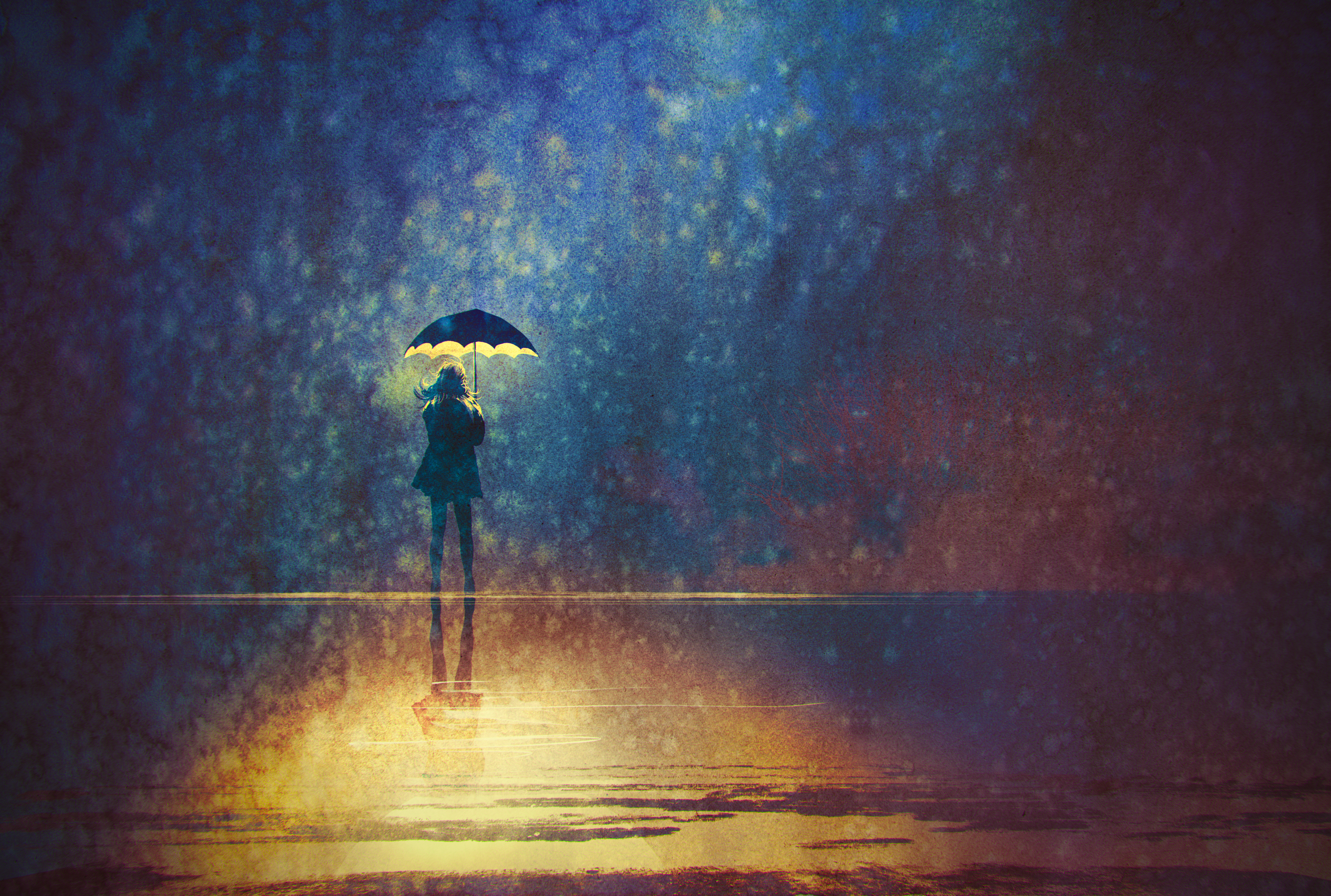How to overcome your inner cynic and embrace gratitude (without being a total cheeseball)
In a world that's always going to have problems, it turns out that it's surprisingly addictive to remember there are things to be (cautiously) joyful about, too


A free daily email with the biggest news stories of the day – and the best features from TheWeek.com
You are now subscribed
Your newsletter sign-up was successful
I am a cynical person by choice. I wear my cynicism like a shell, a kind of emotional armor that prevents people and things from accessing my mushy insides. This is important because secretly, I cry during kids' movies and pharmaceutical commercials. When people tell me nice things, my eyes get glossy. Pictures of baby animals wreck me.
No matter! Never let them see you vulnerable, never reveal your soft underbelly, right? A person needs to maintain a hard exterior to survive in this messed-up, scary world. If I show myself as "weak" — i.e., pleasantly happy, comfortable with my choices, okay — I'll be taken advantage of, somehow.
My cynicism has other roots as well. For one, there's the worry that saying something is good and I am glad for it means it will be yanked away from me, post-haste. (Don't worry, this is something I've been working on in therapy.) To be fine in a moment, too, seems to contradict everything I feel is important about helping those who have less or are less empowered or more threatened than I am. How can I be "fine" when so many aren't? Isn't that somehow denying my duty as a good human in society? Instead of feeling grateful for myself, shouldn't I feel pissed off for them?
The Week
Escape your echo chamber. Get the facts behind the news, plus analysis from multiple perspectives.

Sign up for The Week's Free Newsletters
From our morning news briefing to a weekly Good News Newsletter, get the best of The Week delivered directly to your inbox.
From our morning news briefing to a weekly Good News Newsletter, get the best of The Week delivered directly to your inbox.
And so I wear the armor of the cynic. I scoff at things like babies dressed up in adorable hats and placed in adorable buckets to make adorable calendars, compliments, pumpkin spiced lattes, affirmations in Soul-Cycle and yoga, and, of course, the most commoditized supposed-to-be-joyful thing of all: the gratitude journal.
At a dinner recently I came out with it to two friends, with whom I was talking about the state of the world and how we feel and how we should feel.
"I hate gratitude!" I said.
They both looked at me like I was not only a gratitude-hater but also kind of a monster. One of them sipped her wine. The other said, "I actually like it. I've been keeping a list of things that make me feel good for the last year."
A free daily email with the biggest news stories of the day – and the best features from TheWeek.com
"Like what?" asked the first friend, and the second opened up the Notes app on her iPhone and started reading. Some of her gratitude items weren't even that happy — maybe they were even a bit sad, but made her realize important things — but I was nodding along, anyway. Oh. That's what gratitude could be. Not a journal that you buy and pencil performative happy thoughts in, a writing akin to the stock photos of perfect families that come in the frames you buy at the store. It's something you come up with on your own, ad hoc, that expresses who you are and how you feel and what you do and don't want in your life. It might even be a little bit ugly, this gratitude.
"I should do something like that, too," I said, and promptly didn't.
What I did do, however, was sign up for an online meditation class, which is something that people who hate gratitude certainly don't do. (Who was I becoming? was a question I was starting to ask myself regularly.)
At 7 a.m. on Wednesdays I would wake and open up my computer and engage in a video chat with a favorite yoga instructor (yes, yoga too!) where she'd guide us through a meditation for 20 minutes, and then answer any questions and talk to us about it for the next 20. I practiced in-bed meditation, feeling grateful for still being in bed (gratitude for blankets, it is real!), and gratitude that it was a one-way camera and she couldn't see me. I'd breathe in peace and breathe out pain. I'd think about how I was glad to be able to do this, just to breathe. Afterward, I'd feel a strong burst of gratitude because I could go back to sleep for an hour.
I had to admit, spending time with these conscious and semi-conscious thoughts really did make me feel more in control of whatever it was I was in control of, and kind of okay. "You sound like you're doing fine," my therapist told me during a visit in which I ranted for nearly our entire session about how an array of things were difficult. "Just because things are hard doesn't mean you're not okay. The question is, why can't you say that — that you're fine?"
"I don't know!" I told him. "How can I be fine? What is fine, even?" and then: "Maybe this is just my personality."
Around that same time, I talked to my mom about a shoulder surgery she'd had directly following a knee surgery. "I don't know why all these things are happening to me!" she said. "But you can still get around," I told her. "And you're getting better. You know what you need? Maybe you should start a gratitude journal."
"That would be interesting," she told me, and we both laughed.
Thanksgiving, the most gratitude-y of American holidays, is upon us, and I still don't have a gratitude journal. It's likely I never will — at least not one that I buy in the store. I slept through my last meditation class, though I plan to make it up later. I still can't walk into therapy and pronounce myself fine, probably because therapy costs way too much to do that.
But I have felt faint glimmers of contentment rising in my gut, or my heart, or my brain — from wherever happiness rises — when I think about how I have people in my life that I love, how I am working to be better (and working) daily, how I have a body that functions and a brain that usually does, too. How even in chaos there is possibility. How at the bottom of it all there is just breathing.
This is where the gratitude gets you: It's a mood-changer, like sipping a glass of wine. It might be slightly less fun, but also, it doesn't give you a hangover, and you can do it anywhere. My friend with the iPhone list says there are studies about gratitude releasing oxytocin in your brain and counteracting things like comparison and envy, and that there "so many practices to cultivate gratitude" which I interpret as the ability to do it your own way, with or without a journal. I am grateful to her for sharing.
In a world that's always going to have problems, it turns out that it's surprisingly addictive to remember there are things to be (cautiously) joyful about, too: really good pizza and episodes of Law and Order that you haven't yet seen that start right when you get to the gym and moms who share your sense of humor. It makes me feel more powerful about fighting those things that I'm not grateful for, that I'm downright angry about.
Cynicism remains a shell I feel quite comfortable in, and resting bitch face can be a matter of safety, too. I'm fine with not being "fine." I still hate the idea of commoditized gratitude, the shiny-happy panacea you buy in a store. But be assured, there are times in which I feel really quite grateful on the inside about the things that are important. That's really where it matters, anyway.
Jen Doll is the author of the memoir Save the Date: The Occasional Mortifications of a Serial Wedding Guest. She's also the managing editor for Mental Floss magazine and has written for The Atlantic, Esquire, Glamour, Marie Claire, The Hairpin, New York magazine, The New Republic, The New York Times Book Review The Village Voice, and other publications.
-
 Why are election experts taking Trump’s midterm threats seriously?
Why are election experts taking Trump’s midterm threats seriously?IN THE SPOTLIGHT As the president muses about polling place deployments and a centralized electoral system aimed at one-party control, lawmakers are taking this administration at its word
-
 ‘Restaurateurs have become millionaires’
‘Restaurateurs have become millionaires’Instant Opinion Opinion, comment and editorials of the day
-
 Earth is rapidly approaching a ‘hothouse’ trajectory of warming
Earth is rapidly approaching a ‘hothouse’ trajectory of warmingThe explainer It may become impossible to fix
